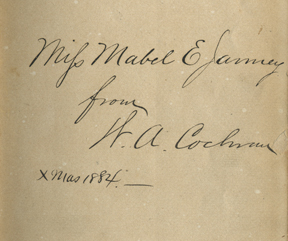Who doesn’t remember learning about George Washington and his trek across the Delaware River or Paul Revere and his “midnight ride”? From kindergarten forward, a parade of history teachers recounted stories of young soldiers going off to battle to fight heroically for our independence.
But what about the books that relate those accounts, the texts that actually tell those tales? It may seem strange to think about, but they have histories, too. Many of the volumes in David Munn’s Revolutionary War collection contain scribbles or comments in the margins and front covers known as “marginalia.” These notes establish “provenance,” or the history of ownership of something. The inscriptions also give a human element to something otherwise inanimate—they elevate books from ink and paper to quasi-living things with pasts all their own.
By looking at whom books belonged to, and when they were received, we can begin to imagine how they were used and enjoyed. Both young boys and young girls were reading some of the very books in this case as far back as 127 years ago; the front covers reveal that Water Waif: A Story of the Revolution, The Young Continentals at Monmouth, and Jersey Rebel were all given as Christmas presents from 1884-1951. The Silver Buckle: A Tale of the Revolution was a New Year’s gift, given on the second day of 1932.
There are examples like Three Girls of the Revolution that is chock-full of the commentary of a married woman who owned it in 1939. She wrote in the margins as if having a conversation with future readers about “pokeberry ink,” which she had made and used, and the thinly veiled names of the New Jersey towns included in the narrative—those are some historically significant scribbles. But then there is something like Mistress Madcap, which falls at the other end of the spectrum; it is just amusingly graffitied by a young and disgruntled future author.
These hand-written messages tell a story as much as the printed words do. They provide a history not of the Revolutionary War, but of the books written about it and the people who owned them.
Bell, Kensil. Jersey Rebel. New York: Dodd, Mead & Co., 1951.
Bladen, Elizabeth S. Water Waif: A Story of the Revolution. Philadelphia: Claxton, Remson & Haffelinger, 1876.
Crumpton, M. Nataline. The Silver Buckle: A Tale of the Revolution. Philadelphia: Henry Altemus Co., 1899.
Jerrell, Anne R. Three Girls of the Revolution. Philadelphia: American Sunday-School Union, 1876.
McIntyre, John T. The Young Continentals at Monmouth. Philadelphia: Penn Publishing, 1912.
Sherman, Edith Bishop. Mistress Madcap. Garden City: Doubleday & Co., 1935.
Provenance from Water Waif.
